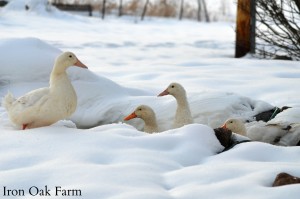 The first of the year is approaching rapidly. Many times thoughts of healthy resolutions, eating better, exercising and overall wellness start to enter everyone’s thoughts. A fresh, new start to a promising year. I’ve found that it’s also a good time to think about re-examining the health of the animals on our farm. The goats are hopefully pregnant again and it’s time to start thinking about adjusting their supplements in preparation for their freshening of milk, and their babies to come. The chickens, guineas, ducks and turkeys will also be raising young this spring. Their bodies are taking a break from egg laying through the cold, grueling winter. It’s a nice time to give everyone a boost!
The first of the year is approaching rapidly. Many times thoughts of healthy resolutions, eating better, exercising and overall wellness start to enter everyone’s thoughts. A fresh, new start to a promising year. I’ve found that it’s also a good time to think about re-examining the health of the animals on our farm. The goats are hopefully pregnant again and it’s time to start thinking about adjusting their supplements in preparation for their freshening of milk, and their babies to come. The chickens, guineas, ducks and turkeys will also be raising young this spring. Their bodies are taking a break from egg laying through the cold, grueling winter. It’s a nice time to give everyone a boost!
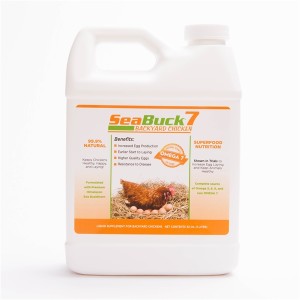 Right now we are experimenting with a product called Seabuck 7. We are doing a 30 day trial and I plan to report what we find in the health differences in our flock on the new supplement.
Right now we are experimenting with a product called Seabuck 7. We are doing a 30 day trial and I plan to report what we find in the health differences in our flock on the new supplement.
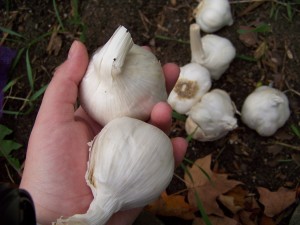 After much research, I’ve also decided to add garlic to their feeding regimen.
After much research, I’ve also decided to add garlic to their feeding regimen.
It might sound funny, but it was actually our dog that led me to make this change.
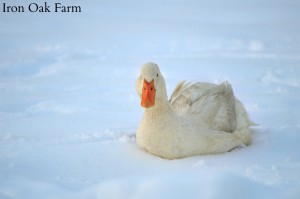 For a long time I’ve always thought that garlic, like onions, was toxic to chickens. This debate exists in the dog world as well. I’d always heard to never give dogs onions or garlic. So when sharing a bite of pork, or steak with our dog, I was always careful to never include meat that was heavily seasoned with the vegetable bulbs.
For a long time I’ve always thought that garlic, like onions, was toxic to chickens. This debate exists in the dog world as well. I’d always heard to never give dogs onions or garlic. So when sharing a bite of pork, or steak with our dog, I was always careful to never include meat that was heavily seasoned with the vegetable bulbs.
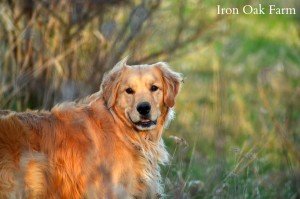 It wasn’t until we switched dog food brands. Our golden retriever was having skin irritation issues and ear infections. Our vet suggested that we switch to a dog food that was wheat and corn free. We found a grain-free holistic brand and his skin and ear issues were completely gone within a week. We were very happy with this new dog food but I noticed that in the ingredients list, garlic was included. Not just included, but sort of “advertised” as a healthy addition. This confused me. Wasn’t garlic and onions bad for dogs?
It wasn’t until we switched dog food brands. Our golden retriever was having skin irritation issues and ear infections. Our vet suggested that we switch to a dog food that was wheat and corn free. We found a grain-free holistic brand and his skin and ear issues were completely gone within a week. We were very happy with this new dog food but I noticed that in the ingredients list, garlic was included. Not just included, but sort of “advertised” as a healthy addition. This confused me. Wasn’t garlic and onions bad for dogs?
I started doing a bit more research and learned that while garlic and onion are in the same family of vegetables their nutritional makeup is quite different.
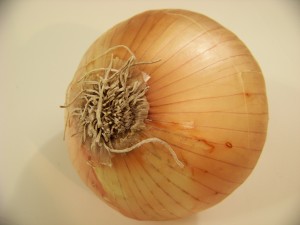 As onions and garlic grow, they absorb sulfur in the soil. These sulfuric compounds are the reason onions and garlic smell so fragrant and add so much flavor to food. It’s also the reason why we cry when chopping onions. Onions and garlic contain one sulfuric compound that has a level of toxicity, this element is thiosulphate. In large doses it is even toxic to humans. However our systems are able to process the amounts that are in both garlic and onions without harm.
As onions and garlic grow, they absorb sulfur in the soil. These sulfuric compounds are the reason onions and garlic smell so fragrant and add so much flavor to food. It’s also the reason why we cry when chopping onions. Onions and garlic contain one sulfuric compound that has a level of toxicity, this element is thiosulphate. In large doses it is even toxic to humans. However our systems are able to process the amounts that are in both garlic and onions without harm.
Onions contain much higher quantities of thiosulphate than garlic, which is why it is safe to feed garlic (in small quantities) to our chickens but not onions.
So why bother to feed garlic if there are any concerns at all?
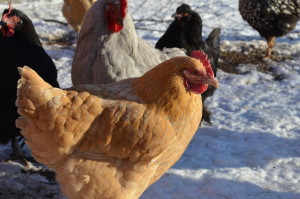 The reason I’m interested in feeding garlic to our flock is because it’s heavily supported claims that it helps aid the immune system and assists in respiratory ailments.
The reason I’m interested in feeding garlic to our flock is because it’s heavily supported claims that it helps aid the immune system and assists in respiratory ailments.
Winter time is the perfect formula for bacterial infections. Due to the weather, the flock is cooped up more often, there’s less free ranging which means less nutritious, fresh grass and weeds, less exposure to sunshine, and healthy insects etc. The harsh weather also puts more strain on the flock.
Garlic seems to be a great addition to help our birds combat the more difficult season.
Here’s some more stuff I found on garlic. While most of this is not scientifically backed, many swear to these benefits:
Garlic is a great antibacterial
Supports respiratory health
Supports immune systems
Larger and quantity of eggs
Lowers the sulfur content in droppings which can lead to a better smelling coop
Some say it makes the gut less favorable for worms and parasites.
The only bad thing I could find, was that some were concerned that the addition might give their eggs an “off” flavor. However, many said this was simply not true.
I will report back to you on how our flock is doing with the new addition to their diet.
Here are some common sense suggestions:
Do not feed in large quantities
As with any dietary change, do so gradually and see how your flock reacts
Discuss any concerns with your veterinarian
I encourage you to do your own research, speak to your veterinarian and decide for yourself what you feel comfortable feeding your flock.
Do you feed your chickens garlic? What health benefits do you see with this addition? Share with the community by leaving a comment below, or visit the Community Chickens Facebook Page.













15 Comments
I’ve been using garlic for 5 years now and find it helps my chickens get through the winter months without any respiratory issues. I also use it at least once every two or three weeks just to keep them healthy and worm free. I mash one garlic clove and add it to their water. They love to eat it raw also!
When you feed the chickens garlic, do you chop it up, leave it whole or separate the cloves? I would like to try this as I grow my own garlic and have extra throughout the year.
How do you add this to your feed and what is the quantity? I have 30 free range chickens. I don’t know if I should cut up some cloces and offer it free choice or if I should mix a certain amount per pound of food.
I may have to try adding the cloves to water. I’m concerned a little because my cats and dogs drink out of those buckets when they’re down at the barn. I don’t believe that a little garlic will harm a cat or dog, but I’m not sure about them drinking it daily.
Thanks!
Garlic can cause a disease called Heinz Body Hemolytic Anemia in cats, dogs and horses. Cats and,small dogs are much more susceptible to it. Also, garlic is listed as toxic on the ASPCA’s website at: https://www.aspca.org/pet-care/animal-poison-control/toxic-and-non-toxic-plants/garlic
Personally, I wouldn’t take the chance of adding it to water that other animals share; it’s not worth the risk. Searches found very interesting, but conflicting opinions. The search terms I used were (1) feeding garlic to chickens, and (2) is garlic safe to feed to chickens (both returned some of the same pages). Hope this helps!
How do you get garlic into the chicken’s diet?
I have been giving garlic to my dogs for years. It does seem to have many medical benefits. I also think it helps with the horrible flea issue we have here in Southeast Texas. My husband takes garlic for his blood pressure and we both take it for all then other medical benefits. We do take a pill form, but I cook with a lot of fresh garlic as well. I make a garlic dog cookie and I crumbled it up and the the chickens have a treat. They loved it. The goats and mini donkey love the garlic dog cookies as well.
My chickens eat all my chives, right down to the bulbs! And the eggs taste just the same, no oniony taste. Also, I put garlic bulbs in their water to protect against lice.
Two years ago, I bought home three young chickens, who appeared to be healthy. Within two weeks, several of my original flock was sick with a nasty head/cold illness. I separated the three, one of which died, and began feeding them garlic soaked dog food twice a day. The other chickens did not get sick, and the other two got well. I kept them separated for a month. I gave them garlic/water soaked dog food all winter long and they were as healthy as can be and laid eggs all winter long. I give and always have given garlic to my dogs and chickens. After that I do not bring home chickens from outside sources. Any new ones come from the original flock. I do have a rooster which protects the hens and does a great job.
A clove of garlic in a small plastic bottle with holes in then left in the smsll chickens water bowl keeps all the usual diseases away I would think the garlic, s antibiotic powers mskes it work
Curious…?
How do you feed the garlic to the chickens?
Raw or cooked garlic? Cloves or the whole head?
I use crushed garlic with pain yogurt and my girls go crazy about it!
I simply split a couple of cloves in two lengthwise (don’t really think that’s all that important) and put it in their water. It seeps out all of the good stuff that garlic has to offer gradually during the day, if water is not fouled I’ll even let it go one more day. I’ve been happy with the results!
In what form do you provide the garlic (raw, powder, etc.), and do you offer it separately or mix it in with feed?
I read on the internet that adding a few halved cloves of garlic to a gallon of water once or twice a week is good for the girls. While I don’t do it every week, I try to remember to add garlic at least twice a month – so far, so good! I also add ACV (with “mother”) at least three times a week to their water.